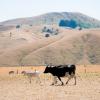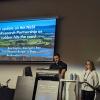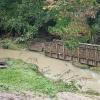Join our online Office Hour sessions in February 2024!Session will be hosted on Zoom. Click on the link below to save the date & Zoom link to your Google calendar. All details indicated below a... Read more
NeSI is looking for an experienced DevOps and Integration Programmer to join our team on a fixed term (6 months) basis. You will design and implement a suite of open-source products underpinning an... Read more
The Carpentries is a global program to teach foundational computational and data management skills to researchers. New Zealand trains several potential Carpentries Instructor trainees every year an... Read more
In March 2024, NeSI will be offering a virtual Machine Learning 101 workshop and you are invited to fill out an expression of interest form to signal your interest in attending. Date for the worksh... Read more
Nisha Ghatak, NeSI Research Communities Advisor and Training Lead, has been elected to the Board of Directors of The Carpentries, a global community focused on teaching coding and data science skil... Read more
When Cyclone Gabrielle blew through Aotearoa in February 2023, it unleashed unprecedented rainfall, triggered widespread flooding and landslip events, and caused significant damage to homes and inf... Read more









